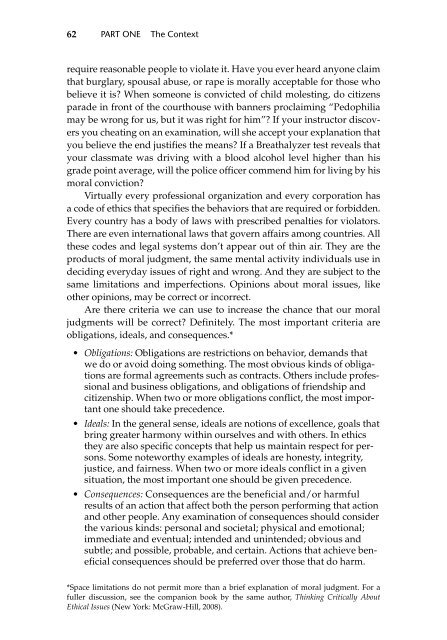Beyond Feelings
Beyond Feelings
Beyond Feelings
You also want an ePaper? Increase the reach of your titles
YUMPU automatically turns print PDFs into web optimized ePapers that Google loves.
62 PART ONE The Context<br />
require reasonable people to violate it. Have you ever heard anyone claim<br />
that burglary, spousal abuse, or rape is morally acceptable for those who<br />
believe it is? When someone is convicted of child molesting, do citizens<br />
parade in front of the courthouse with banners proclaiming “Pedophilia<br />
may be wrong for us, but it was right for him”? If your instructor discovers<br />
you cheating on an examination, will she accept your explanation that<br />
you believe the end justifies the means? If a Breathalyzer test reveals that<br />
your classmate was driving with a blood alcohol level higher than his<br />
grade point average, will the police officer commend him for living by his<br />
moral conviction?<br />
Virtually every professional organization and every corporation has<br />
a code of ethics that specifies the behaviors that are required or forbidden.<br />
Every country has a body of laws with prescribed penalties for violators.<br />
There are even international laws that govern affairs among countries. All<br />
these codes and legal systems don’t appear out of thin air. They are the<br />
products of moral judgment, the same mental activity individuals use in<br />
deciding everyday issues of right and wrong. And they are subject to the<br />
same limitations and imperfections. Opinions about moral issues, like<br />
other opinions, may be correct or incorrect.<br />
Are there criteria we can use to increase the chance that our moral<br />
judgments will be correct? Definitely. The most important criteria are<br />
obligations, ideals, and consequences.*<br />
• Obligations: Obligations are restrictions on behavior, demands that<br />
we do or avoid doing something. The most obvious kinds of obligations<br />
are formal agreements such as contracts. Others include professional<br />
and business obligations, and obligations of friendship and<br />
citizenship. When two or more obligations conflict, the most important<br />
one should take precedence.<br />
• Ideals: In the general sense, ideals are notions of excellence, goals that<br />
bring greater harmony within ourselves and with others. In ethics<br />
they are also specific concepts that help us maintain respect for persons.<br />
Some noteworthy examples of ideals are honesty, integrity,<br />
justice, and fairness. When two or more ideals conflict in a given<br />
situation, the most important one should be given precedence.<br />
• Consequences: Consequences are the beneficial and/or harmful<br />
results of an action that affect both the person performing that action<br />
and other people. Any examination of consequences should consider<br />
the various kinds: personal and societal; physical and emotional;<br />
immediate and eventual; intended and unintended; obvious and<br />
subtle; and possible, probable, and certain. Actions that achieve beneficial<br />
consequences should be preferred over those that do harm.<br />
*Space limitations do not permit more than a brief explanation of moral judgment. For a<br />
fuller discussion, see the companion book by the same author, Thinking Critically About<br />
Ethical Issues (New York: McGraw-Hill, 2008).


